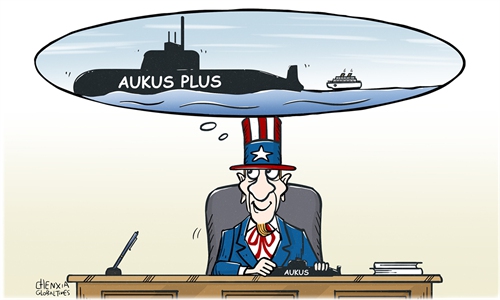
Kurt Campbell Photo: AFP
It seems that on Wednesday, US President Joe Biden's No.2 diplomat came up with a new pretext to peddle the questionable AUKUS, the trilateral security pact between the US, UK and Australia, to more countries. On that day, US Deputy Secretary of State Kurt Campbell told Washington-based think tank Center for a New American Security that AUKUS' submarine capabilities "have enormous implications in a variety of scenarios, including in cross-strait circumstances" - "a rare linkage between Taiwan and AUKUS," according to the Reuters.
Campbell's words reveal that the US' constant attention on pushing the AUKUS is never about "promoting peace and stability in the Indo-Pacific region." Despite Biden claiming that this trilateral partnership is "not a challenge to anybody," the fact that the US is counting on AUKUS to play a certain role in the Taiwan question proves that Washington wants to use this trilateral partnership to challenge the status quo in the Taiwan Straits with the intention of deterring the Chinese mainland. Regional peace and stability will be undermined should AUKUS become a new tool for Washington's interference in the Taiwan question.
Back in 2021 when AUKUS was just established, the White House said that this partnership is "not about any one country." Now it seems that Campbell's blatant linkage between the Taiwan question and AUKUS gave a big slap in the face of Washington's words two years ago, as the Taiwan question is the core of the core interests of China.
A Chinese military expert told the Global Times that the deployment of the AUKUS will, to a certain extent, have an impact on the status quo in the Taiwan Straits, as the partnership will strengthen in-depth cooperation - both among its members and with other close partners - on various issues, including on the Taiwan question. On the other hand, actively seeking its expansion, AUKUS is making eyes on regional countries, some of which hold strong hostility to China. Once those countries join the group, it will create more trouble to China's resolution to the Taiwan question.
In addition to Taiwan, the US and its allies also attempt to destabilize the situation in the South China Sea. Given that Washington is currently increasingly pulling allies to intervene in the South China Sea issue to back the Philippines against China, the Chinese military expert believes that we cannot rule out the possibility that the US will form a linkage between the South China Sea and AUKUS one day. This is because the AUKUS' nature of countering China determines that China-related issues, be they the Taiwan question or the South China Sea issue, will top the agenda of any US alliance established in Asia-Pacific, while the deployment of the military strategy of such an alliance will also revolve around containing China's development.
Since its formation, AUKUS has been a wedge the US drives in regional peace and stability by luring allies into this process under the banner of military-technological cooperation. But let's talk about the elephant in the room: it's afraid that AUKUS won't even achieve its Pillar 1, which is to support Australia to acquire its nuclear-powered submarines, on time. Media reports on Friday show that US shipyards are running up to three years late in building new Virginia-class submarines for Canberra, raising even greater concerns about the future of AUKUS.
Against this backdrop, it is hard not to suspect that by emphasizing AUKUS's role in the Taiwan Straits as a hook to the "already expected benefits," Campbell's words on Wednesday also aimed to give a shot in the arm into AUKUS in an attempt to prove the significance of AUKUS' existence and boost allies' confidence in the pact.
However, does a partnership that may not even achieve its initial and fundamental goal really have a future? How will a bonus exist when none of the "benefits" it relies on can be actually delivered? It's a pipe dream for Washington to bet on using a non-existent bonus to attract more partners and allies into AUKUS, only proving how ridiculously conceited and lacking self-awareness the US is.
The author is a reporter with the Global Times. xiawenxin@globaltimes.com.cn



